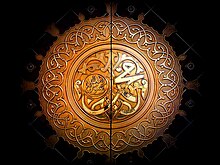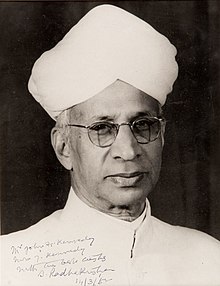Portal:Religion
The Religion Portal
Religion is a range of social-cultural systems, including designated behaviors and practices, morals, beliefs, worldviews, texts, sanctified places, prophecies, ethics, or organizations, that generally relate humanity to supernatural, transcendental, and spiritual elements—although there is no scholarly consensus over what precisely constitutes a religion. Different religions may or may not contain various elements ranging from the divine, sacredness, faith, and a supernatural being or beings. (Full article...)
 Vital article
Vital article

The Bible is a collection of religious texts or scriptures which to a certain degree are held to be sacred in Christianity, Judaism, Samaritanism, Islam, the Baháʼí Faith, and other Abrahamic religions. The Bible is an anthology (a compilation of texts of a variety of forms) originally written in Hebrew, Aramaic, and Koine Greek. The texts include instructions, stories, poetry, prophecies, and other genres. The collection of materials that are accepted as part of the Bible by a particular religious tradition or community is called a biblical canon. Believers in the Bible generally consider it to be a product of divine inspiration, but the way they understand what that means and interpret the text varies. (Full article...)
 Did you know (auto-generated)
Did you know (auto-generated)
- ... that Freedom of Religion South Africa filed an unsuccessful lawsuit to keep child spanking legal?
- ... that religious studies scholar C. Jouco Bleeker believed that religions are like acorns?
- ... that in her 2021 book White Evangelical Racism, professor of religion Anthea Butler called American evangelicalism a pro-Trump, "nationalistic political movement"?
- ... that the nonconformist minister Ichabod Chauncey was banished from England under the Religion Act 1592 and spent two years in exile in Holland where he published a defence of his actions?
- ... that the Grave with the Hands commemorates a married couple, divided by society and religion, with hands clasped over a cemetery wall after death?
- ... that Gamaliel's principle has been used to support religious pluralism and reforms within religious groups?
John Calvin (/ˈkælvɪn/; Middle French: Jehan Cauvin; French: Jean Calvin [ʒɑ̃ kalvɛ̃]; 10 July 1509 – 27 May 1564) was a French theologian, pastor and reformer in Geneva during the Protestant Reformation. He was a principal figure in the development of the system of Christian theology later called Calvinism, including its doctrines of predestination and of God's absolute sovereignty in the salvation of the human soul from death and eternal damnation. Calvinist doctrines were influenced by and elaborated upon the Augustinian and other Christian traditions. Various Congregational, Reformed and Presbyterian churches, which look to Calvin as the chief expositor of their beliefs, have spread throughout the world. (Full article...)













































![Image 1 Prometheus tortured by the eagle (black-figure kylix, 560-550 BC) In Greek mythology, Prometheus (/prəˈmiːθiəs/; Ancient Greek: Προμηθεύς, [promɛːtʰéu̯s], possibly meaning "forethought") is one of the Titans and a god of fire. Prometheus is best known for defying the Olympian gods by taking fire from them and giving it to humanity in the form of technology, knowledge and, more generally, civilization. (Full article...)](http://upload.wikimedia.org/wikipedia/en/d/d2/Blank.png)





















